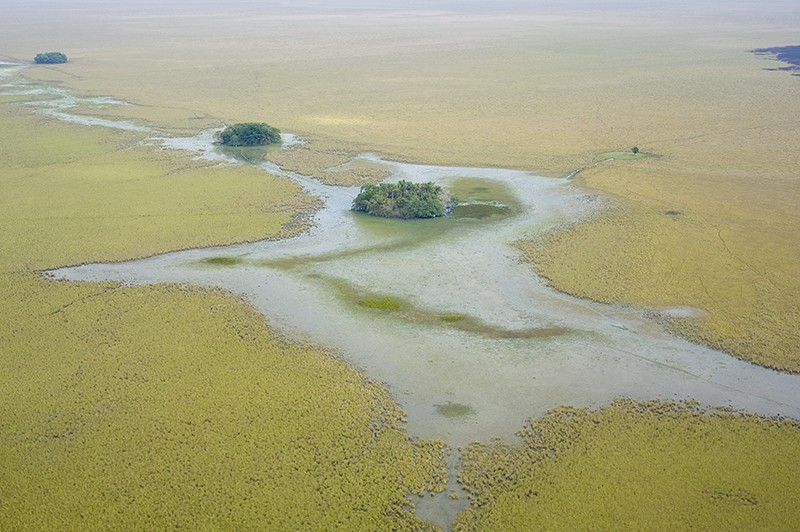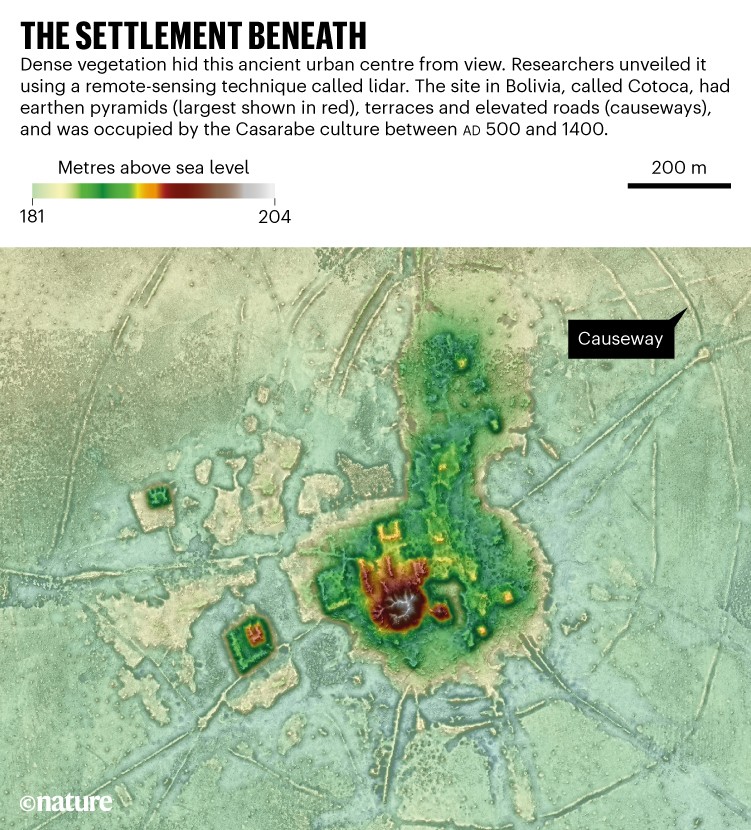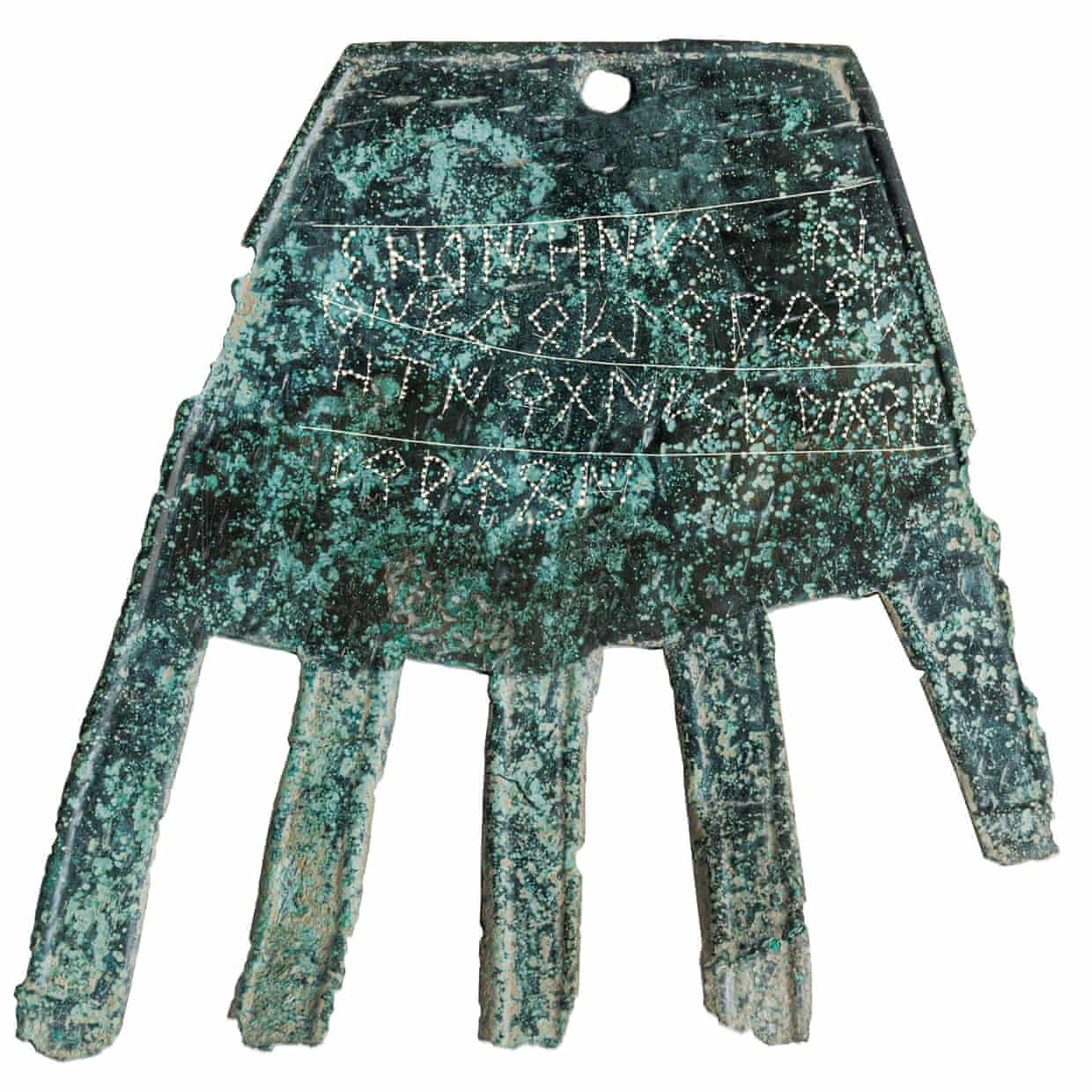S9 now. Still hooked on it and this season they are digging up more funds than everI was absolutely hooked on it at the start but haven’t kept up lately.
The History Thread
- Thread starter SteveJ
- Start date
You are using an out of date browser. It may not display this or other websites correctly.
You should upgrade or use an alternative browser.
You should upgrade or use an alternative browser.
calodo2003
Flaming Full Member
Season 9? They’ve milked it that long?S9 now. Still hooked on it and this season they are digging up more funds than ever
Anyone else a fan of the curse of oak island?
reckon they will find any significant treasure there that’s not pieces of wood?
I mean there's obviously feckall down there right?
its been 200 years i think they'd have found some treasure by now
I thought this was really interesting. Also beyond this specific subject, it exposes how a lot of archaeological interpretation stems from assumptions, creating a kind of circular argument that strenghtens itself with each find that's interpreted following the same assumption. There are probably quite a few historical reconstructions that lean on this more heavily than we realize.
Anyway, back to the issue at hand, here's the summary I first saw:
Anyway, back to the issue at hand, here's the summary I first saw:
The full article is in The Observer (or really The Guardian, as far as I can tell): https://www.theguardian.com/science...-sexual-revolution-bones-sex-dna-birka-loversNature Briefing said:Archaeology’s sexual revolution
Techniques that allow researchers to identify the sex of ancient human remains are rewriting what we thought we knew about how our predecessors lived. A grave in Italy dating back 1,500 years contains not a man and a woman holding hands, as was widely reported, but two young men. A Viking warrior found in Sweden was female, not male, as had been assumed by its nineteenth-century discoverers. “There’s a real lack of creativity about how other people lived their lives,” says bioarchaeologist Pamela Geller, “because we are so wedded to the categories that we have in place now.”
Last edited:
I thought this was really interesting. Also beyond this specific subject, it exposes how a lot of archaeological interpretation stems from assumptions, creating a kind of circular argument that strenghtens itself with each find that's interpreted following the same assumption. There are probably quite a few historical reconstructions that lean not this more heavily than we realize.
This has been my main issue with archaeologists (and a lot of historians in general) for a long time. When you actually look at the basis on which they make a lot of assertions about the past, you quickly realize that in many cases its just pure guesswork on their part that then becomes part of the established belief.
greatscott9930
New Member
Shackleton's ship the "Endurance" found after 107 years. Some incredible pictures in the video.
https://www.bbc.com/news/science-environment-60662541
https://www.bbc.com/news/science-environment-60662541
This has been my main issue with archaeologists (and a lot of historians in general) for a long time. When you actually look at the basis on which they make a lot of assertions about the past, you quickly realize that in many cases its just pure guesswork on their part that then becomes part of the established belief.
that’s why it’s both a great and shite job.
Link to article with further information: Mystery warriors made the fastest migration in ancient history | Science | AAASNature Briefing said:A lightning-fast ancient migration
Around 1,500 years ago, horse-riding warriors known as the Avars appeared in southeastern Europe seemingly out of nowhere and established an empire lasting more than 200 years. Now, DNA evidence suggests that they crossed a continent in the span of a decade or two. Human remains from Avar tombs in what is now Hungary closely match those from an individual buried just a few decades earlier in what is now eastern Mongolia — almost 7,000 kilometres away. “The DNA is so close it’s got to be within one generation, or less,” says geneticist and co-author Choongwon Jeong.
Organic Potatoes
Full Member
First stirrups in Europe, eh? It’s cool to discover technology tidbits like that that you take for granted now.Link to article with further information: Mystery warriors made the fastest migration in ancient history | Science | AAAS
It's interesting actually - it's not uncommon that little technological (or tactical) inventions like that are behind the sudden rise (and fall) of groups of people. But that detail is often overlooked in historical overviews, making history look like a random succession of kingdoms.First stirrups in Europe, eh? It’s cool to discover technology tidbits like that that you take for granted now.
Youtube decided to give me a recommendation and it transpires that Time Team is now on youtube with a new series. I used to watch it now and then when I was a kid.
- Joined
- Mar 19, 2008
- Messages
- 16,671
Here's a nifty simulation of the world of the 17th century Muslim pilgrim en route to the Hijaz - http://www.hajjtrail.com/
VorZakone
What would Kenny G do?
- Joined
- May 9, 2013
- Messages
- 37,682
Those Fayum mummy portraits are fascinating. I'm actually somewhat surprised they aren't more famous. They're some of the best glimpses of how people looked in those days.
- Joined
- Mar 19, 2008
- Messages
- 16,671
This is great stuff, and in line with findings from the past few decades that the Amazon was not some kind of 'green desert' devoid of human occupation (or only at low levels of development), but in fact well population by advanced civilizations.

News article: ‘Mind blowing’ ancient settlements uncovered in the Amazon (nature.com)
Research article: Lidar reveals pre-Hispanic low-density urbanism in the Bolivian Amazon | Nature
This is what the area looks like now:

And here is a map of what there used to be:

Cool title, too.Nature Briefing said:Lasers reveal pyramids in the Amazon
The southwest corner of the Amazon Basin was once the site of complex urban settlements built by ancient civilizations. Researchers used a laser remote-sensing technology called lidar to map land inhabited by the Casarabe culture, which existed around AD 500 to 1400 in what is now Bolivia. Observations from the air reveal that Casarabe people lived in densely populated centres, featuring 22-metre-tall earthen pyramids, that were encircled by kilometres of elevated roadways. They also had large water-management infrastructure made of canals and reservoirs.
News article: ‘Mind blowing’ ancient settlements uncovered in the Amazon (nature.com)
Research article: Lidar reveals pre-Hispanic low-density urbanism in the Bolivian Amazon | Nature
This is what the area looks like now:

And here is a map of what there used to be:

Last edited:
- Joined
- Nov 19, 2009
- Messages
- 59,123
They're trying to find out why so few archaeological remains have been found from battle, given the tens of thousands who died.
Mystery of Waterloo’s dead soldiers to be re-examined by academics
https://www.theguardian.com/science...-dead-soldiers-to-be-re-examined-by-academics
Mystery of Waterloo’s dead soldiers to be re-examined by academics
Dr Kevin Linch, a University of Leeds expert in the Napoleonic wars, who is not involved in the work, said there was a good case for arguing that the bones of the dead were taken for use as fertiliser, although other activities, such as ploughing or scavenging by animals, could have led to their dispersal.
https://www.theguardian.com/science...-dead-soldiers-to-be-re-examined-by-academics
- Joined
- Mar 19, 2008
- Messages
- 16,671
@2cents et al., I'm trying to find a book to give a good overview of the British Empire, any recommendations?
Just to get back to this, I've been reading Piers Brendon's Decline and Fall of the British Empire and would highly recommend it as an accessible introduction to the subject.
That looks really interesting. I'm putting it on my wishlist!Just to get back to this, I've been reading Piers Brendon's Decline and Fall of the British Empire and would highly recommend it as an accessible introduction to the subject.
- Joined
- Mar 19, 2008
- Messages
- 16,671
@Carolina Red (or anyone else), I'm looking for a good general history of colonial/British America (I suppose covering the 17th and 18th centuries). Anything to recommend?
American Colonies: The Settling of North America by Alan Taylor@Carolina Red (or anyone else), I'm looking for a good general history of colonial/British America (I suppose covering the 17th and 18th centuries). Anything to recommend?
- Joined
- Mar 19, 2008
- Messages
- 16,671
American Colonies: The Settling of North America by Alan Taylor
Excellent, thank you.
No problem. If this ends you up on a side tangent about the French & Indian War, let me know!Excellent, thank you.
- Joined
- Mar 19, 2008
- Messages
- 16,671
Any good podcasts about history? Preferably about medieval times or not Europe-centrered.
Empire by William Dalrymple and Anita Anand has been excellent. First series is on British rule in India, but they seem to be planning to expand it beyond that in the future -
Empire by William Dalrymple and Anita Anand has been excellent. First series is on British rule in India, but they seem to be planning to expand it beyond that in the future -
Yeah very good, I've listened to a few already. Got to know them through "the rest is history" podcast, they had an introduction there.
Organic Potatoes
Full Member
Empire by William Dalrymple and Anita Anand has been excellent. First series is on British rule in India, but they seem to be planning to expand it beyond that in the future -
Dalrymple is great for that era and region of the world.
RedDevilQuebecois
New Member
- Joined
- May 27, 2021
- Messages
- 8,256
Egyptology fans are waiting to see where those tunnels lead, but this could be the biggest archaeological discovery in decades if that is indeed the lost tomb.
Tunnel discovered beneath Egyptian temple may lead to Cleopatra's tomb, archaeologist says
Tunnel discovered beneath Egyptian temple may lead to Cleopatra's tomb, archaeologist says
Last edited:
I've been quite interested in this find:
Ancient ivory comb shows that self-care is as old as time: The Canaanite comb is inscribed with a warning for tiny lice—the oldest written sentence discovered in the language.
For some reason, most of the reporting is about that warning for lice, but I think it's more interesting that this full phrase in the Canaanite script is found on something as mundane as a comb. With the comb dating to 1700 BCE, this sort of use implies that the script was very commonplace at the time and thus must have originated a good bit earlier.
Ancient ivory comb shows that self-care is as old as time: The Canaanite comb is inscribed with a warning for tiny lice—the oldest written sentence discovered in the language.
For some reason, most of the reporting is about that warning for lice, but I think it's more interesting that this full phrase in the Canaanite script is found on something as mundane as a comb. With the comb dating to 1700 BCE, this sort of use implies that the script was very commonplace at the time and thus must have originated a good bit earlier.
Also quite cool:
https://www.theguardian.com/world/2...-artefact-rewrites-history-of-basque-language
Archaeologists found a bronze hand ('the hand of Irulegi') near Pamplona in Spain that features a pre-Roman inscription in the language of the Vascones. They have long been assumed to be the ancestors of the Basques, but their language had never been found, so there could be no certainty. But the inscription (using a Greek alphabet?) features the word 'sorioneku', which is clearly a forerunner of the modern Basque word 'zorioneko' (good luck or good omen) - undeniably proving the linguistic connection.

https://www.theguardian.com/world/2...-artefact-rewrites-history-of-basque-language
Archaeologists found a bronze hand ('the hand of Irulegi') near Pamplona in Spain that features a pre-Roman inscription in the language of the Vascones. They have long been assumed to be the ancestors of the Basques, but their language had never been found, so there could be no certainty. But the inscription (using a Greek alphabet?) features the word 'sorioneku', which is clearly a forerunner of the modern Basque word 'zorioneko' (good luck or good omen) - undeniably proving the linguistic connection.

- Joined
- Mar 19, 2008
- Messages
- 16,671
- Joined
- Mar 19, 2008
- Messages
- 16,671
RedTiger
Half mast
Fake news
Oh, I thought that was obvious, I thought it was a kind of joke on how old this kind of sentiment is. The word 'book' gives it away. It would be a very free translation, beyond what's reasonable.
Apart from that, we don't have Assyrian texts from 2800 BCE; the language as such isn't attested before the 2nd millennium. But that's not as obvious to lay people. The tablet of the picture also looks first millennium to me, but I'm really not sure and it doesn't matter for the quote.
- Joined
- Mar 19, 2008
- Messages
- 16,671
Oh, I thought that was obvious, I thought it was a kind of joke on how old this kind of sentiment is. The word 'book' gives it away. It would be a very free translation, beyond what's reasonable.
Apart from that, we don't have Assyrian texts from 2800 BCE; the language as such isn't attested before the 2nd millennium. But that's not as obvious to lay people. The tablet of the picture also looks first millennium to me, but I'm really not sure and it doesn't matter for the quote.
Yeah I clearly need to avoid dabbling in the ancient stuff.
I looked at the Twitter guy, and he spams dozens of posts every day. Not sure what his angle is with all of it.Yeah I clearly need to avoid dabbling in the ancient stuff.
RedTiger
Half mast
Followers. His angle is followers.I looked at the Twitter guy, and he spams dozens of posts every day. Not sure what his angle is with all of it.
Oh, sure. But I meant: I'm not sure if he actually cares about and checks the stuff he's (re)tweeting, or if he just puts out whatever he comes across.Followers. His angle is followers.
- Joined
- Mar 19, 2008
- Messages
- 16,671
Yeah very good, I've listened to a few already. Got to know them through "the rest is history" podcast, they had an introduction there.
Dalrymple is great for that era and region of the world.
Series 2 is looking at the rise and fall of the Ottomans.
- Joined
- Mar 19, 2008
- Messages
- 16,671
Listened to the first episode, this seems pretty good:
- Joined
- Mar 22, 2014
- Messages
- 15,561
- Supports
- Piracy on the High Seas.
They've found similar stuff in Bolivia. Absolutely fascinating and highly impressive - and really puts paid to ideas that the Americas were relatively underdeveloped when they first came into contact with Europe, or also that those jungle areas are age-old pristine forest. (Which leads to other interesting discussions, but anyway.)
Share:

